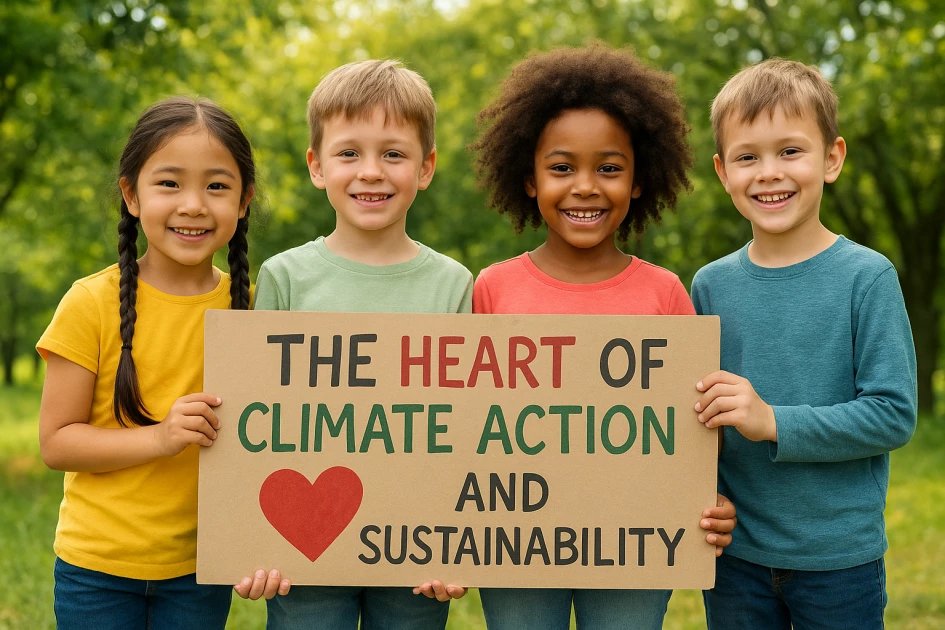OPINION: Children - The heart of climate action and sustainability

This is an AI-generated image.

Audio By Vocalize
Children are the future of our world. They are not just beneficiaries of development but active agents in shaping a sustainable future. Their inclusion is critical because climate action without continuity and sustainability at its core is a failed cause.
We cannot watch as we engage in development actions that overlook the very people, children, who will inherit the outcomes. The urgency is clear and per UNICEF report of 2022, climate change threatens to sweep across communities and ecosystems, disrupting lives and, in extreme cases, entire civilizations.
To act wisely, we must take a three-pronged approach, learning from the past, addressing the present, and securing the future. Children are at the centre of this vision, not only as tomorrow’s leaders but as today’s voices whose rights must be protected and amplified.
The inclusion of children in climate action must be intentional and age-appropriate, tailored to their specific needs and interests. This ensures meaningful engagement through child-friendly dialogues, facilitated by teachers and experts but led by the children themselves.
Evidence underscores the economic and developmental value of such inclusion. For instance, according to UNICEF and UNCCLEARN, every dollar invested in reducing childhood stunting yields an estimated $18 return in productivity.
Proper early-life nutrition, especially during the first 1,000 days from conception to age two, is critical to brain development and lifelong learning capacity. In contrast, malnutrition and deficiencies in micronutrients such as iodine can lead to irreversible cognitive deficits, reducing IQ levels by 10–15 points (WHO).
In Kenya, where millions of children still face hunger, this connection between nutrition, education, and climate resilience cannot be ignored. A child who is well-nourished and educated is better equipped to innovate, adapt, and contribute to a climate-resilient economy.
Kenya is making commendable progress in embedding child-focused strategies within climate action. The Ministry of Education’s active role and its inclusion in national climate planning have been significant. Education is a priority area under Kenya’s Nationally Determined Contribution (NDC), a commitment outlining how the country plans to reduce emissions and build resilience.
These ambitions are implemented through the National Climate Change Action Plan (NCCAP) 2023–2028, which sets out targeted activities to drive this agenda forward.
Beyond the education sector, Kenya also integrates children within the youth and children sector and the gender and climate sector, ensuring a cross-cutting approach that addresses systemic inequalities while building capacity for future leadership.
A shining example of this integration is
the reinstatement of the 4K Club (Kuungana, Kufanya, Kusaidia Kenya). This
school-based initiative equips children with life skills linked to climate
action, including agroforestry, biodiversity conservation, sustainable food
systems, and innovations that build resilience.
At the Africa Centre for Sustainable and Inclusive Development (Africa CSID), we have embedded this model in our programs. Recognizing that children are among marginalized groups, as defined by the Constitution of Kenya and international frameworks, we actively support their participation in climate solutions.
For example, at Othora Comprehensive School, we have established a vibrant 4K Club where children manage vegetable gardens and agroforestry projects. These hands-on activities not only teach sustainable farming but also nurture critical thinking, teamwork, and leadership. The goal is to raise a generation of climate-conscious adults capable of tackling the challenges of tomorrow while contributing to food and nutrition security.
Kenya’s schools often sit on vast tracts of arable land, yet children still experience high rates of hunger. Hunger affects not only health but also brain development, concentration, and academic performance. Research shows that malnourished children face lifelong setbacks, undermining national economic growth.
While the school feeding program has improved attendance in some regions, some of the marginalized communities like Nyatike remain underserved. By promoting school-based farms managed through 4K Clubs, organizations like Africa CSID help address hunger while providing practical climate education. These farms become living classrooms where children grow food, learn resilience, and see the immediate benefits of their actions.
The inclusion of children cannot stop at the school level. During the inaugural Africa Climate Summit (ACS), Kenya’s First Lady H.E. Rachel Ruto provided children with a platform to learn and contribute to national dialogues. At global platforms such as the UNFCCC Conference of Parties (COPs), initiatives like the Youth and Children Pavilion are creating opportunities for young voices.
However, the reality is that children from marginalized communities rarely access these spaces. Bridging this gap means investing in equitable opportunities which include training, travel support, and mentorship, to ensure that every child, regardless of background, has a voice in shaping solutions for the planet.
Children today face unprecedented climate challenges. By the 2050s, eight times more children globally will be exposed to extreme heatwaves, with surges in floods, wildfires, and other climate shocks. Protecting and empowering them is both a moral imperative and an economic strategy for resilient, sustainable development.
As Africa CSID’s work shows, when we equip children with knowledge, skills, and platforms to engage, they not only build resilience for their communities but also inspire innovative solutions that benefit entire nations. Climate action must, therefore, place children at its core, not as passive participants but as leaders in the making.
Looking ahead, as the continent prepares
for the second Africa Climate Summit (ACS2), there is a unique opportunity
to center the children’s agenda in all discussions and outcomes. It
is my hope that ACS2 will not only acknowledge the role of children but also
deliver intentional, actionable commitments that embed their voices
and priorities into Africa’s climate roadmap. Doing so will ensure that climate
action is not just inclusive in name but transformative in practice hence building
a future where no child is left behind in the fight for a sustainable planet.


Leave a Comment